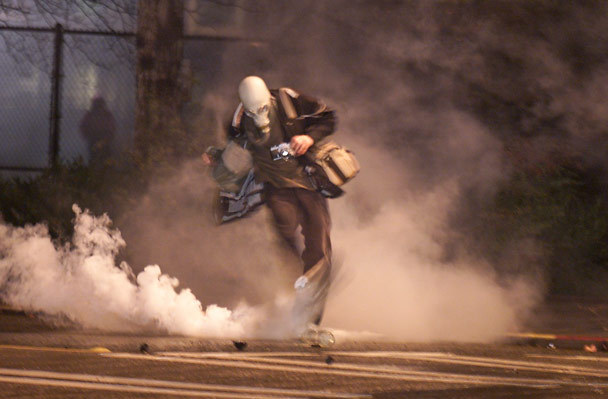Entries by Michael Atkins (1064)
STL Turns 3!

STL turned three today! Woo-hoo!
It’s been a lot of fun. Looking forward to three more!
Washington Supreme Court Affirms $8M Default Judgment as Discovery Sanction
If you ever practice in Washington — even pro hac vice — I’ve got a case you should know about.
It isn’t a trademark case, but any case in which discovery sanctions result in a $8 million default judgment is worth heeding.
In this product liability case, Washington’s Clark County Superior Court found the attorney representing car manufacturer Hyundai Motor America, admitted to practice in the case pro hac vice, unilaterally limited his client’s responses to plaintiff’s discovery requests and otherwise frustrated straight-forward attempts to obtain discoverable information.
After an evidentiary hearing that spanned three days, the trial court found: “(1) there was no agreement between the parties to limit discovery, (2) Hyundai falsely responded to [the plaintiff’s] request for production and interrogatories, (3) [the plaintiff] was substantially prejudiced in preparing for trial, and (4) evidence was spoiled and forever lost.”
As a consequence, the trial court found the only suitable remedy was a default judgment.
The Washington Supreme Court’s reaction? On Nov. 25, it affirmed in a 7-2 decision. (Dissent here.)
“Trial courts need not tolerate deliberate and willful discovery abuse,” Justice Richard Sanders wrote. “Given the unique facts and circumstances of this case, we hold that the trial court appropriately diagnosed Hyundai’s willful efforts to frustrate and undermine truthful pretrial discovery efforts by striking its pleadings and rendering an $8,000,000 default judgment plus reasonable attorney fees. This result appropriately compensates the other party, punishes Hyundai, and hopefully educates and deters others so inclined.”
The case cite is Magaña v. Hyundai Motor America, No. 80922-4 (Wash.) (Nov. 25, 2009).
Seattle Times article here.
WTO Riots Ten Years Later: The Tension Continues Between Trade and Rights
 10 years ago: the “Battle in Seattle” WTO riots
10 years ago: the “Battle in Seattle” WTO riots
The World Trade Organization came to Seattle ten years ago.
Protests and riots ensued.
Seattleites won’t soon forget the tear gas, smashed windows, police in riot gear, out-of-town “anarchists,” giant ninja turtles, and chants of “The whole world is watching!”
Of course, the tension between international trade and human rights that existed then still exists today.
This is evident in the recent seizure of Indian-made pharmaceuticals in the Netherlands on their way to Brazil. Free trader Roger Bate writes the drugs were seized not because they were counterfeit, but because they allegedly violated European Union patents — even though they were not subject to patent protection in either India or Brazil.
These seizures seemingly pit drug companies against those in need.
As a Brazilian representative to the European Union put it: “Many new worldwide measures aggressively protect pharmaceutical monopolies under the guise of fighting counterfeits – blocking competition and jeopardizing global access to medicines in the process…. Rather than investing taxpayer dollars enforcing private rights, public bodies should promote price-lowering competition, drug quality and affordable access to medicines.”
This isn’t the case with seizing counterfeit medicine, which Mr. Bate argues benefits everyone but the counterfeiter.
“Let’s be clear about what enforcing a private property right actually means. A trademark violation means that a trader or manufacturer is trying to mislead the public as to the true identity of a product. Such a drug may act as intended, but how can the public trust it if the manufacturer hides his identity? Indian companies have their products faked, just like Western companies. Enforcing trademarks and other labeling infractions improves public health.”
The dispute over the seizure appears headed to the WTO for resolution.
Photo credit: Rod Mar / The Seattle Times
Western District Denies Priceline.com's Motion to Dismiss False Advertising Claim
STL readers may recall that Expedia, Inc., and Hotels.com, L.P., this summer sued Priceline.com in the Western District for false advertising.
Expedia and Hotels.com allege that Priceline’s advertisements mislead customers into believing that they can achieve a 50% savings on any hotel reservation made on the Priceline Web site when the advertised savings are available, if at all, only with Priceline’s “name your own price” feature.
Priceline moved to dismiss, arguing that plaintiffs’ request for a ban on comparative advertising is not available under the Lanham Act, and that the Lanham Act does not impose a duty to disclose.
On Nov. 23, Judge Robert Lasnik denied the motion. (The court also denied a request for a stay and granted dismissal of plaintiffs’ common law false advertising claim.)
The court found:
“Defendant’s first challenge to plaintiff’s Lanham Act claim does not take issue with the sufficiency of the allegations. Instead, defendant focuses on one of plaintiff’s requests for relief and argues that such relief is unavailable under the Lanham Act. Plaintiffs also have asserted claims under the common law and the Washington Consumer Protection Act. Whether the requested ban on comparative advertising could be an appropriate form of relief under those causes of action has not been addressed. Nor has defendant shown that the Lanham Act claim, or any separable part thereof, should be dismissed simply because one form of relief requested in the complaint may be unavailable.
“Defendant also argues that the Lanham Act fails as a matter of law because the act does not impose an affirmative duty to disclose. A simple failure to disclose is not a violation of the Lanham Act because ‘[t]he absence of any statement is neither ‘false’ nor a ‘representation.’ Plaintiffs allege that defendant’s advertising blurs the distinction between its fixed-price and blind-bidding services, thereby creating the false impression that plaintiff’s fixed-price services are more costly than the same services offered by defendants. Plaintiffs demand that Priceline disclose the differences between its fixed-price and ‘name-your-own-price’ services. The nature and scope of the desired disclosures are not delineated, however, and it is not clear what ‘false representation’ defendant is accused of making or whether the comparative inference plaintiffs draw from the advertisements is reasonable. Nevertheless, in the context of this motion to dismiss, the allegations of the complaint must be construed in the light most favorable to plaintiffs. The Court will therefore assume that plaintiffs have properly alleged a false or misleading representation of fact, namely that Priceline’s advertisements falsely claim that consumers can attain a 50% cost savings by using its fixed-price service when compared with plaintiffs’ fixed-price service. Based on that understanding, the allegations of the complaint suffice to state a cause of action under the Lanham Act.”
The case cite is Expedia, Inc. v. Priceline.com Inc., No. 09-712 (W.D. Wash. Nov. 23, 2009).
See Rebecca Tushnet discussion here.
Court Finds Nine Year Delay Too Long to Sustain Trademark Infringement Suit
Plaintiff ExperExchange, Inc., licenses its optical character recognition (OCR) software to manufacturers and software developers. Defendant DocuLex, Inc., is a software development company that sells document management software. In May 1999, DocuLex entered into a license agreement with ExperExchange.
In August 2008, ExperExchange filed suit in the Northern District of California, alleging that DocuLex breached the parties’ license agreement by using ExperExchange’s technology and trademarks in more than the one product the agreement authorized.
DocuLex defended on the ground of laches. It argued that because ExperExchange waited nine years to assert the License Agreement covered only a single product, DocuLex expended considerable resources developing products incorporating ExperExchange’s technology and trademarks, even though it could have switched to another OCR provider that could have provided it with substantially similar software at a similar price.
The court agreed.
“Here, both requirements for laches are met. First, Plaintiff unreasonably delayed in initiating this action. As discussed above, the undisputed fact that Plaintiff received royalty reports indicating that DocuLex was incorporating Plaintiff’s software into products other than PDF.Capture is enough to have given Plaintiff constructive notice of this conduct. Plaintiff’s assertion that it was unaware of certain features of PDF.Capture when it entered into the License Agreement, and therefore did not understand that Defendants’ conduct infringed its copyrights until recently, is unpersuasive. In particular, there is no evidence in the record from which a trier of fact could reasonably infer that Plaintiff could not have obtained this information had it acted with reasonable diligence when it learned that DocuLex was incorporating Plaintiff’s software into products other than PDF.Capture.
“Second, Defendants have demonstrated that they will suffer prejudice as a result of the delay. In particular, it is undisputed that DocuLex continued to incorporate Plaintiff’s [OCR] software into its products, many of which Plaintiff now alleges are infringing. Thus, the delay has prejudiced DocuLex by increasing the potential liability it faces with respect to these products. At the same time, DocuLex has continued to expend resources developing this products, in reliance on its presumed right to use the [OCR] software in them. Nor has Plaintiff presented any evidence to counter Defendants’ assertion that it could and would have used OCR scanner technology from another source had it realized that it would be faced with potential liability based on use of Plaintiff’s products.
“Accordingly, the Court concludes that Plaintiff’s claims for copyright and trademark infringement are barred under the doctrine of laches.”